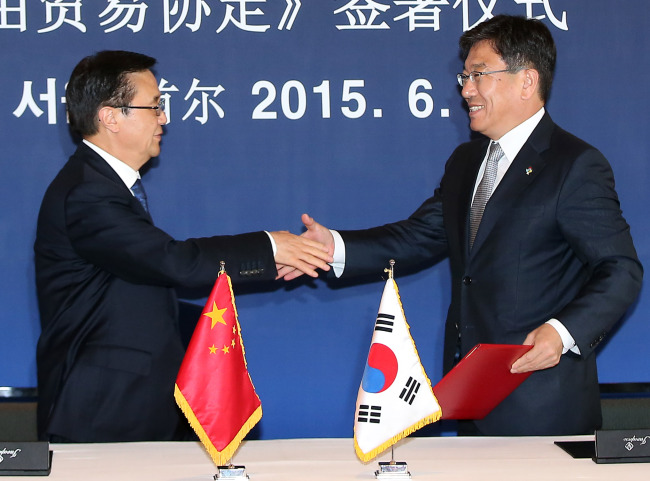South Korea and China signed a free trade agreement Monday that is expected to become a platform for the two economies seeking new growth engines and to bring the 23-year bilateral cooperation up to a new level.
The gradual removal of tariffs on agricultural, maritime and manufactured products, as well as opening up those industries of the world’s largest market, is expected to give Korea’s gross domestic product a 0.96 percent increase and boost customer welfare by $14.6 billion within 10 years of the FTA effectuation, Seoul officials said.
The FTA will enable a market with a population of 1.4 billion and GDP of $12 trillion. It also makes Korea the only country that has FTAs with the world’s three largest economies ― the U.S., EU and China. Korea now has deals encompassing 52 nations, accounting for 73.45 percent of the global economy.
The gradual removal of tariffs on agricultural, maritime and manufactured products, as well as opening up those industries of the world’s largest market, is expected to give Korea’s gross domestic product a 0.96 percent increase and boost customer welfare by $14.6 billion within 10 years of the FTA effectuation, Seoul officials said.
The FTA will enable a market with a population of 1.4 billion and GDP of $12 trillion. It also makes Korea the only country that has FTAs with the world’s three largest economies ― the U.S., EU and China. Korea now has deals encompassing 52 nations, accounting for 73.45 percent of the global economy.

The signing of the FTA was held between Korean Trade Minister Yoon Sang-jick and his Chinese counterpart Gao Hucheng at the Grand Hyatt Seoul Hotel. The pact now awaits the National Assembly’s ratification and is expected to go into effect six months from the respective governments’ notification of the approval.
The signing was supported by South Korean President Park Geun-hye.
“The free trade agreement with China, our largest trade partner and the world’s fastest-growing market, will bring a breath of fresh air to our economy and the future growth engine. This will also enhance our status as a global investment hub,” Park said at her meeting with her staff on the day.
She also said in a letter to Chinese President Xi Jinping that the FTA would become a historic milestone to further deepen strategic cooperative partnership between the two countries.
Xi said in his letter to Park that the FTA will lead to new momentum in ties between the two countries and bring substantial benefits to their citizens.
The Korea-China FTA is regarded as a pivotal pact for both countries.
China is by far the largest country Korea has made such agreements with. Korea is China’s largest importer, taking 9.7 percent of its imported market, followed by Japan with 8.3 percent and the U.S. with 7.8 percent.
For China, this is the largest bilateral deal in terms of trade volume. “This is the most high-level, specific but all-around, and balanced FTA we have had by far,” Chinese deputy trade minister Wang Shou Wen told reporters.
The agreement is expected to provide the modality as well as the driving force for progress toward a South Korea-China-Japan FTA, and a Regional Comprehensive Economic Partnership.
The RCEP is a proposed FTA between member states of the Association of Southeast Asian Nations ― Brunei, Myanmar, Cambodia, Indonesia, Laos, Malaysia, the Philippines, Singapore, Thailand and Vietnam ― and the six states with which ASEAN has existing FTAs ― Australia, China, India, Japan, South Korea and New Zealand.
Under the Korea-China agreement, Seoul will eliminate tariffs on 92 percent or 11,272 kinds of imported items from China within the next 20 years. China will scrap tariffs on 91 percent or 7,428 kinds of items imported from Korea within the same period.
Korea is likely to benefit in the manufacturing ― mostly in petrochemical, machinery, electronic goods and consumer goods ― as well as service and agricultural industries. A total of 310 items made in the inter-Korean Gaeseong industrial complex will also be included in the tariff reduction or elimination.
China’s opening of the service sector, including legal, entertainment and environmental services, will also enable Korea to thrust into China with better protection in copyrights and intellectual rights.
The Korean government vowed to improve agricultural, maritime and other industries that will be affected by the FTA.
However, the deal has practically left out the automobile sector, which both sides have been reluctant to open and remain insistent on protecting. Since many Korean-brand cars are manufactured in China through joint ventures, the effect of the exclusion will be minimal, Seoul officials said.
The South Korea-China FTA was first suggested in 2004 through joint research by the two parties. Negotiations kicked off in 2012, only to be agreed upon in November 2014 and initialed in February 2015.
However, the deal has met criticism. Rep. Kim Je-nam of the main opposition New Politics Alliance for Democracy claimed that China since April has started opening up aggressively to foreign investment and has given tariff reduction to its trade partners already. “There is very little benefit in having this long and hard FTA with China at this point,“ she said.
By Bae Ji-sook (baejisook@heraldcorp.com)
-
Articles by Korea Herald


![[Exclusive] Korean military set to ban iPhones over 'security' concerns](http://res.heraldm.com/phpwas/restmb_idxmake.php?idx=644&simg=/content/image/2024/04/23/20240423050599_0.jpg&u=20240423183955)

![[Graphic News] 77% of young Koreans still financially dependent](http://res.heraldm.com/phpwas/restmb_idxmake.php?idx=644&simg=/content/image/2024/04/22/20240422050762_0.gif&u=)



![[Pressure points] Leggings in public: Fashion statement or social faux pas?](http://res.heraldm.com/phpwas/restmb_idxmake.php?idx=644&simg=/content/image/2024/04/23/20240423050669_0.jpg&u=)










